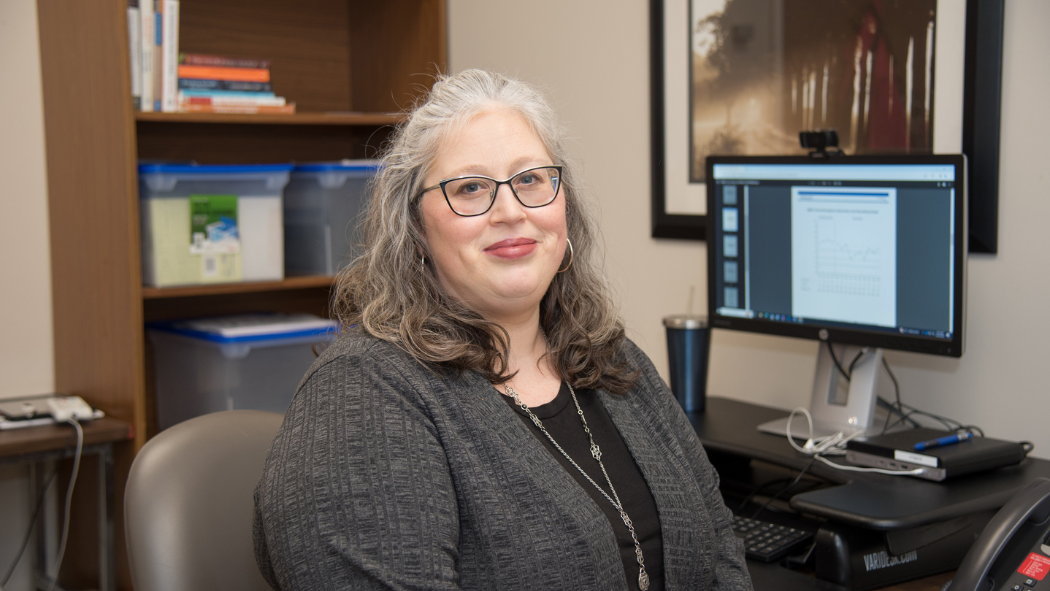
February 27, 2024
Dr. Sarah Vernon-Scott, Psychologist in the Epilepsy Monitoring Unit (EMU) in Clinical Neurosciences at London Health Sciences Centre (LHSC), works with a variety of neurology patients, including individuals diagnosed with Psychogenic Nonepileptic Seizures (PNES).
“PNES are events that look like epileptic seizures, but there is none of the correlated brain activity that is seen in epilepsy,” explains Dr. Vernon-Scott. “Psychogenic means ‘from stress’ and stress can mean a lot of different things. But long-term research has suggested that trauma, for example childhood trauma, is a risk factor in developing PNES later in life.”
PNES behaviours can appear as varied as epileptic seizures, from staring blankly into the distance, to big body movements. “To an untrained eye, they can look and feel like seizures,” says Dr. Vernon-Scott. “Even for those trained to spot differences between these conditions, it can be difficult to tell the difference.”
Often, patients come to the EMU for clarification on their diagnosis. If a person visits the Emergency Department and the physician has suspicions based off the patient’s medical history or seizure descriptions, they are referred to the EMU.
“Sometimes the elements of someone’s seizure may not fit into how epileptic seizures and the brain work, and the physician may likely suspect PNES,” says Dr. Vernon-Scott.
However, sometimes getting a correct diagnosis can take a long time. A person with PNES may be diagnosed with epilepsy at first and after trying medications and finding they aren’t working, they are referred to the EMU. “Even though PNES does not cause damage to the brain, it is very disruptive to people’s lives and functioning. For example, a person cannot have a driver’s license if they’re experiencing seizure episodes, PNES can make it difficult to work or take care of yourself or your family, and patients can suffer injuries from the seizures such as fractures, concussions and bruises.
How is PNES diagnosed?
The EMU at LHSC is a unit with 24-hour video electroencephalogram (vEEG) monitoring. “This is the gold standard for diagnosis,” Dr. Vernon-Scott explains. “Electrodes are put on the scalp to capture brain waves and see that activity on the EEG monitor. That’s how the neurologists can see whether a person may have epilepsy or PNES.”
When a person has a seizure or episode, the neurologists then review the EEG and video monitoring to see the behaviour during the seizure and the correlated brain wave activity. If the person is experiencing an epileptic seizure, that will be apparent based off of brain activity. If a person has a seizure or episode and the brain activity does not indicate activity associated with epileptic seizures, then the person is likely to have PNES.
Along with the EEG monitoring by neurologists, Dr. Vernon-Scott performs a thorough psychological assessment, including psychometric measures, as well as a clinical interview with the patient that examines their history to better understand potential risk factors that could be part of the presentation of the seizures.
“On the unit, as a team, we are able to tell what kind of seizure a person is experiencing,” says Dr. Vernon-Scott. “We are able to show the patient, families and caregivers the EEG videos to provide clarity on the episodes and to better understand the treatment. It can get complex, and it is important that patients understand their condition and that they are treated appropriately.”
Providing patients with a proper diagnosis is an interprofessional team approach. “Along with myself, a clinical psychologist, there are neurologists, social workers, occupational therapists, nurses, neuropsychologists and learners, such as fellows and residents,” says Dr. Vernon-Scott. “It’s an interesting intersection between neurology and psychology. I’m happy to be a part of such a great team that serves this unique patient population.”
The two types of psychologists on the team serve distinct purposes. Dr. Vernon-Scott’s role as a clinical psychologist in the EMU largely focuses on a person’s stress, emotions and mental health diagnosis/diagnoses and how they influence someone’s seizures, either epileptic or PNES.
The neuropsychologists focus on the cognitive testing and evaluation of cognitive functioning in the brain, often contributing to pre-surgical evaluations for patients with epilepsy.
“PNES incidence in the general population is low, but it is rather common on our unit,” explains Dr. Vernon-Scott. “Around 30 – 40 per cent of the people who come to the EMU are diagnosed with PNES.”
Treatment for PNES
Dr. Vernon-Scott and those on the EMU team, provide the information a patient needs to better understand their condition, how they came to it and what it means for them moving forward.
Explains Dr. Vernon-Scott, “In these conversations we clarify that we don’t think they are faking the seizures because they are very real – the seizures simply have a different origin. They are experiencing psychogenic seizures, which are not from electrical activity in the brain like epileptic seizures.”
While the seizures are not epileptic, they are still not under the person’s conscious control, even though they can learn to manage them.
“There is research that suggests that the diagnosis itself is significant in getting people on the right path. If a person receives the correct diagnosis and does not require epileptic medication any longer, that can also result in an improvement to how they feel,” says Dr. Vernon-Scott.
“What is often recommended for treatment for patients with PNES is cognitive behavioural therapy,” says Dr. Vernon-Scott. “We see inpatients when they are diagnosed with PNES, and follow some outpatients in our clinic. Otherwise, we try to coordinate and consult with therapists in the community to build capacity with community providers to support those with PNES."
At LHSC, Dr. Vernon-Scott is proud to be a part of an epilepsy unit that has psychologists to support patients. “It’s beneficial in terms of ensuring people get that appropriate diagnosis and treatment path forward that gets them on the right foot when discharged from hospital.”